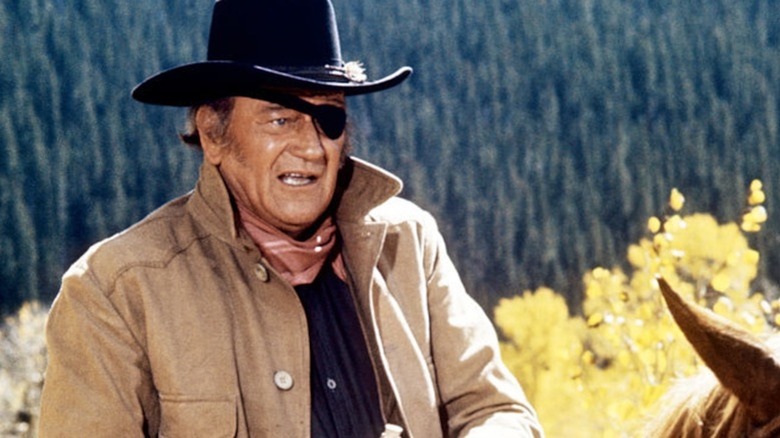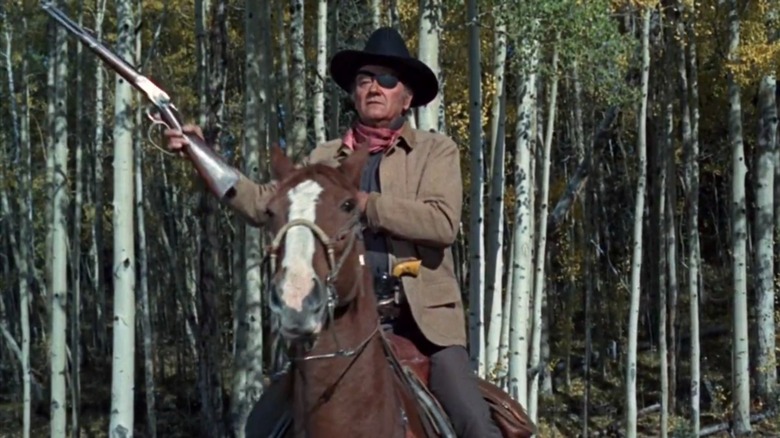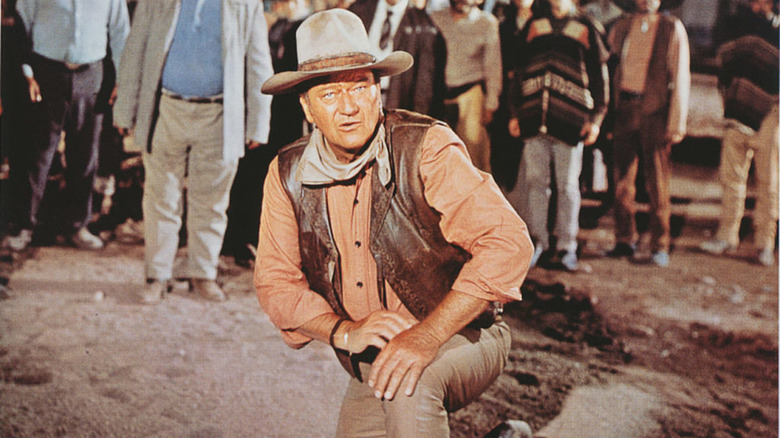True Grit Became The Blueprint For The Rest Of John Wayne's Career
As the 1960s drew to a close, John Wayne's macho, man-of-few-words act was wearing thin. Though some of the movies were pretty good (namely "The Sons of Katie Elder" and "El Dorado"), they were tonally and aesthetically indistinguishable from his '50s work. And this was a problem because the Western was undergoing a metamorphosis via the Spaghetti antics of Sergio Leone's "Man with No Name" and the bloody revisionism of Sam Peckinpah's "The Wild Bunch." If Boomers were going to check out an oater, they weren't going to bother the outmoded, out-of-step-with-the-times Wayne.
The Duke exacerbated his situation in 1968 by making the jarringly jingoistic "The Green Berets," which sought to boost domestic morale for the Vietnam War. The best that can be said is that it was too outlandishly stupid to be taken seriously on any level, but it most certainly harmed Wayne's image. He was officially a relic: too old to be credible as a soldier, and too politically conservative to be anything more than a villain or a joke to the counterculture.
Now in his 60's, Wayne seemed stuck on a one-way stagecoach to irrelevance. Then "True Grit" happened.
Wayne finally acts his age, and has a blast doing it
The character of Reuben "Rooster" J. Cogburn was exactly what Wayne needed at this perilous juncture of his career. An ornery, weathered, hard-drinking U.S. Marshal, Cogburn provided the opportunity for Wayne to loosen up and play the wildcard for once. No one was more aware of how badly he needed this role than Wayne, which compelled him to tell Roger Ebert in 1968 that this was his best role in 20 years.
"'Well, what the hell has there been? I'm always the straight guy who heaves the pack up on his back and shouts, 'Follow me!' Everybody else in the picture gets to have funny little scenes, clever lines, but I'm the hero so I stand there.
Howard Hawks worked out a whole system based on that. He'd just stand me up as a target and run everybody at me. 'El Dorado,' that was just a remake of an earlier picture by Hawks, 'Rio Bravo.' And in both pictures you had Robert Mitchum or Dean Martin as the drunken sheriff, and you had the old deputy and the young kid, and where did that leave me?'"
Wayne is tremendously enjoyable in the role, while Marguerite Roberts' script captures the off-kilter spirit of Charles Portis' novel. Overnight, the stink of "The Green Berets" vanished. "True Grit" was a box-office smash, and Wayne took home his first Best Actor Oscar for his performance. The old curmudgeon was back on top, and, using the "True Grit" model of at long last playing his age, he intended to stay there.
The Duke rides out
The results were mixed, but, considering Wayne's unadventurous choices, better than they could've been. Following the been-there, done-that duo of "Chisum" and "Rio Lobo," Wayne took on the title role of "Big Jake," in which he hunts down the bandits who've kidnapped his grandson with the help of his two headstrong sons. It's relentlessly formulaic, but surprisingly violent for a Wayne Western. "The Cowboys," wherein the star teaches a group of young boys to drive cattle, winds up being a moving tribute on The Duke's legacy.
Wayne took two strangely half-hearted cracks at off-brand Dirty Harry cop movies with "McQ" and "Brannigan," but concluded his career on a beautifully understated note as an aging gunfighter in Don Siegel's "The Shootist." Wayne was never going to go the revisionist route of Peckinpah. He was a red-blooded patriot to a fault, and harbored a multitude of ignorant prejudices. But whatever you think of the man, the larger-than-life star who in large part defined American cinema throughout the middle of the 20th century went out on his own terms, and this is nothing if not fitting.


